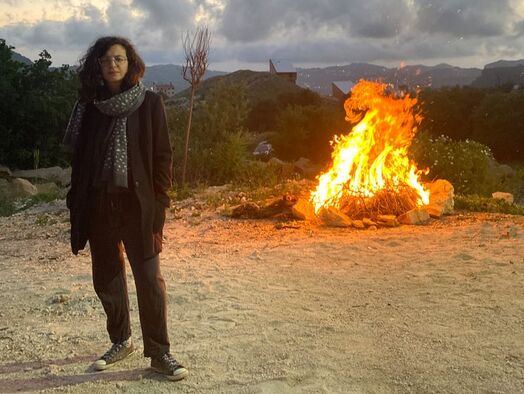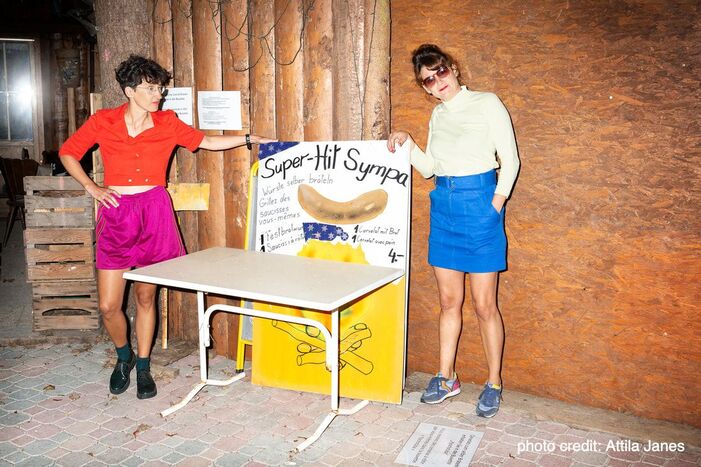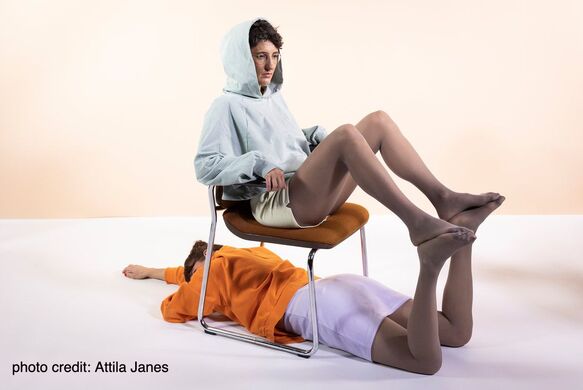Menu
|
Maya Aghniadis loves to invent her own language. She comments good news with Bombastic! or Boom! and refers to all kinds of things and activities as “shizzle” (which, for the Cambridge dictionary, is “a more polite word used instead of the word shit”). Some may say this is gibberish and also will declare it gibberish when it comes to Flugen, the name of Maya Aghniadis’ musical project. According to the Urban Dictionary, Flugen (actual spelling Flügen) means everything and nothing. Maya herself said it in an interview with Project Revolver in 2019: Flugen was a word she used a lot when she didn’t know what to say. She has always been better with music than with words.
And then again, Flugen (the expression) is more than anything and everything. It is what you make of it. For some Flugen is synonymous for a relaxed lifestyle, for others it’s basically just going with life and enjoying the hell out of it. Do not get me wrong: that is not to say that Maya Aghniadis hasn’t any serious ambitions for Flugen (the music). That is not to say that Maya is careless and too easy going on herself when creating music. Quite to the contrary. However, for this writer, Poupayee, Flugen’s new album is the first Flugen record that fully matches the musical goals that Maya Aghniadis has set for herself. Poupayee is not anything, but it is everything and it defines a new musical lifestyle called ethno-electro-jazz. Also in music Maya Aghniadis has invented her own language.
Poupayee has to be viewed and consumed as an album, as a whole, and not as a compilation of songs. One thing leads to another, the sequence of the tracks matters - the track you are hearing, the track before and the track afterwards - and the entire experience when listening to Poupayee is bigger than the sum of its single tracks. “Poupayee tells the story of the different states that a mind can go through,” says Maya Aghniadis. “With every step we come closer to surrender and release to all the shapes of truth.” For impatient characters such as myself, listening to Flugen can be a challenge. Maya Aghniadis has a unique way of composing her music in an almost meditation-like fashion, building up momentum and tension very slowly, very delicately, only step by step. Sometimes it feels like lying on the beach in a hammock, smoking a joint and looking out to the calm sea and waiting for the next wave to break at the shore. This can take a while, but just observing the serenity of the sea brings you the ease of mind that you had been yearning for. When the wave finally arrives, it just might be the next tsunami that surprises you once again. You may run from your hammock but you cannot hide from Flugen’s beats. Maya Aghniadis knows that for some listeners her music feels wobbly. Like a dancer on a rope cautiously trying to hold his balance before he sets one foot forward to precariously move ahead. “That’s not wobbly, that’s just the Flugen craziness”, she says, laughing. Maya is different from the rest of us and so is her music. The music of Poupayee is mostly based on synthesizers and piano, at times underlaid with heavy beats that can probably be felt down on ground floor (I live on fourth floor). Add to this an occasional flute that represents the ethno part of the Flugen sound and the clarinet of Pol Seif. The album starts out rather calm and peaceful but by track three and four - Shades of Blues and Different Ways - hints and flavors of a more dangerous world start to emerge. At first, one barely notices them until we arrive at The Lodge (track 6) where our conscious meets the subconscious and Flugen makes us lose ourselves to a repetitive and broken beat. We then realize that Something Wild (track 7) is bound to happen and that the Peak (track 8) is near where will discover our sensual selfs. "Words are not the essence!"
Such a journey to the truth is never easy as Where To? (track 9) demonstrates. Marwan Tohme (of Lebanon’s indie rock band Postcards) adds his ominous guitar to the Flugen sound and makes this track dark and frightening. We are almost inclined to turn around, not daring to stay the course and to break through this heart of darkness. This would have been a grave error because the final track of Flugen’s new album - Surrender & Release - introduces us to a new world where beautiful melodies fill the air and love takes over.
“Words are not the essence,” Maya Aghniadis explains when describing Poupayee, “gibberish sounds such as the title track itself can bring out the truth more than words”. Music and the emotions it is able to evoke and convey is like a foam, filling the empty spaces in our bodies and our minds. Words can never reach where music can. It is said that children and fools always speak the truth. If the truth lies in gibberish words such as Boom!, Flugen and Poupayee, and in the music these words provoke and entail, then I happily admit: I’m a fool! Poupayee is indeed BOMBASTIC. You can listen to Poupayee on all streaming platforms worldwide. Go here.
0 Comments
They are clever wise guys indeed, Lea Heimann and Katharina Reidy. They name their band Paradisco and someone like me sees Italian gelati in front of him and thinks, okay, now that's a nice play on words with Paradiso and Disco. But when you prepare to interview the two women, a synapse suddenly snaps in your brain: watch out! Wasn’t there something with Para? This is not quite as innocent as it sounded at first, just think of paramilitary and parasites. And paranoia. The story of Paradisco is quickly told: Lea has always played music, Katharina never did. The two friends went to concerts together a lot. And then, in 2015, Lea was tired of her saxophone - she was now more interested in electronica, in sounds and in noises - and almost at the same time Katharina grabbed the app of her musician friend and produced beats and loops with it herself. Three months later they were on stage for the first time at Fri-Son in Fribourg, Switzerland, as Paradisco. With their music, Paradisco want to merge the digital and the analog into a fusion. "We are looking for tones, for sound structures that together form a sphere," says Lea. "We want to provoke a digital-analog approach in which the listener no longer realizes which is one and what is the other." The sphere is an important image when Paradisco talk about their music, especially for Lea. If you think of a glittering disco ball, you're missing the point again, as I did at the beginning of my acquaintance with Paradisco. "The sphere," says Lea, "parabolically stands for an emotion that we want to convey, a conscious, intense feeling." "We want to draw our listeners into the sphere and offer them a new world," Katharina adds. A new world in which love would probably be the priority state. "Love is my lifestyle" is the title of Paradisco's first album, released in 2019. (In female understatement, Paradisco call their record "an EP", even though it contains six songs and all of them are better than the life's work of many a highly hyped artist). Yes, love is our motto, say Paradisco, and we try to live it every day anew. It's a deliberate decision to go through life like this, says Lea, but there are also difficult moments when you reach your limits. "But we have chosen to be brave, without thinking that in the end it all hurts." The disco has been the scene of many heartache moments. But here we are dealing with Paradisco, the disco next to the disco, the disco that is not a real disco but something on the other side of the street. (For linguists: Para is a Greek prefix and can be translated as "at", "besides" or "beyond".) Let's explain the Paradisco principle using the example of "Two Old Stones", the band's brand new video. The song begins with the ostensibly unsuspicious lyrics "I told my mom about you; I said that you are no good for me.” "That's precisely Paradisco. A smooth surface, but it's got philosophy underneath!" "Is that what a woman does," I ask Lea and Katharina, "to bitch to her mother about the awful boyfriend?” "It's a bad relationship," says Katharina, "so bad that I have to tell my mom." "The song is also meant to be ironic," says Lea, "but if you tell your mom, it clearly has a certain significance." "I told my shrink about you, just didn't go over the tongue well," Katharina points out. Then Lea reaches out to swing big. "The song also has something repetitive, we use this as a stylistic device," she says. “But it's also about standards. Who says a norm is a norm? Is it society and what if you break the norms and change the order? What if you break out? "Now these are bigger questions than I would have guessed from the lyrics," I admit. "That's precisely Paradisco. A smooth surface, but it's got philosophy underneath!" Breaking out, leaving norms and guilt behind, that's what we all struggle with in life, not just Paradisco. Later in the song the lyrics go: "It's time to get away, but I can't". Meanwhile, Paradisco are singing “… and I can” on stage. What led to this change of perspective, I ask Lea later via WhatsApp. "The first times we played this song on stage, I noticed that my view of things had changed for me," she replies. “Life had strengthened me in the meantime and I realized that I definitely have a choice and also the strength to change things. This victimization - but I can’t - didn't suit me anymore. ” In the video for “Two Old Stones” it is actor Andri Schenardi who tries to act as a breakaway. He sits at home being bored - prophetic as Paradisco are, they produced the video even before the current Corona lockdown - and does more and more bizarre things, also with the selfie stick, to keep himself busy. A video entirely in the sense of a critique of today's world, in which self-presentation is the preferred means of communication and sexual fantasies and experimental fetishism have to be lived out alone due to circumstances. But then again: You don't want to be made of plastic and you don’t want to be made of stone, and you even dance with a broken neck, as Paradisco sing in their song "Fantaplast". Where do Paradisco want go with their band and music? In any case, we want to continue, say Lea and Katharina in unison, our project springs from an inner necessity. As a result of their love as a lifestyle, Paradisco also get a lot of love back. They like to cooperate with other arts and artists and are often contacted because of that. "People feel like joining in with us." A feeling that is not foreign to Charlotte Gainsbourg, a musical favorite of Lea and Katharina. In one of her songs she defined the Paradisco principle as follows: "In Paradiscos, we're confined to only pleasure; When you're a flame, you'll burn forever." Whether up or down, the escalator to the eternal jive - as one of the possible travel destinations - goes on and on for Lea Heimann, Katharina Reidy and Paradisco. Listen to "Love is my lifestyle" on Bandcamp here. |
EditorKurt is based in Bern and Beirut is his second home. Always looking for that special angle, he digs deep into people, their stories and creations, with a sweet spot for music. Archives
September 2020
Categories
All
I'd love to discover you. Share your creations here.
|




 RSS Feed
RSS Feed
